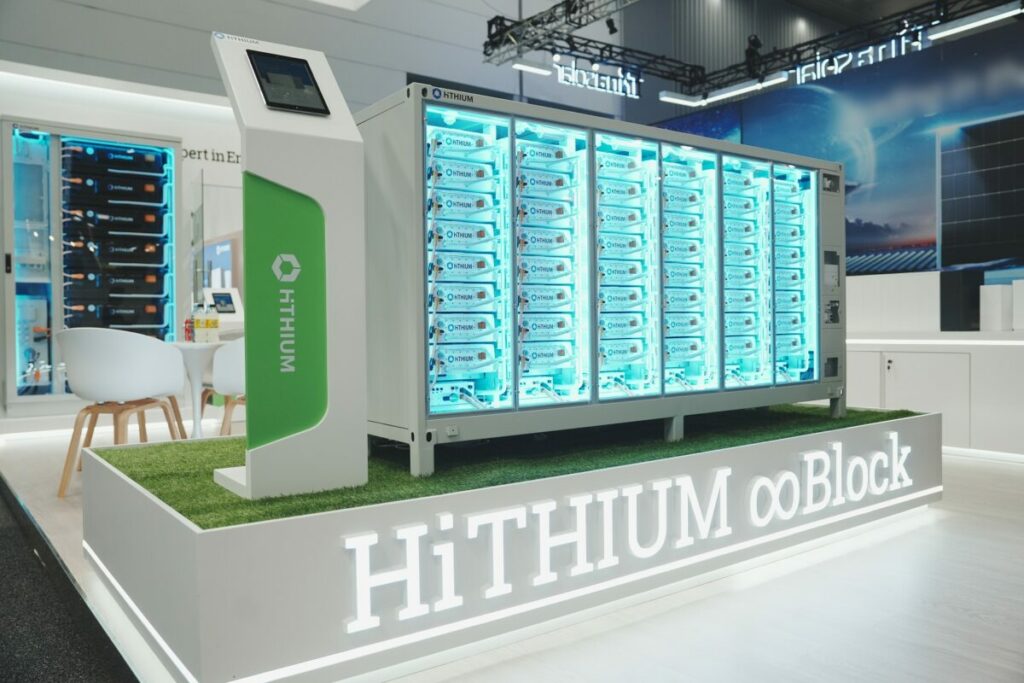
Among the highlights of last week’s All-Energy Australia trade show were announcements of new products, deals and partnerships from major players including Sungrow, Ingeteam and Hithium.
Taking place in Melbourne, Victoria, the event is considered the biggest industry gathering for the sector in Australia, with an emphasis on renewable energy and a rapidly growing presence for energy storage offerings.
Enjoy 12 months of exclusive analysis
- Regular insight and analysis of the industry’s biggest developments
- In-depth interviews with the industry’s leading figures
- Annual digital subscription to the PV Tech Power journal
- Discounts on Solar Media’s portfolio of events, in-person and virtual
A few days ago, Energy-Storage.news reported that Trina Storage, energy storage division of solar module super league (SMSL) member Trina Solar, had debuted its Elementa 2 battery energy storage system (BESS) at the show. Based on a larger format lithium iron phosphate (LFP) cell than its predecessor, Elementa 2 packs up to 4MWh storage capacity into each 20ft container.
Sungrow PowerTitan to power battery ‘Hives’
Clean Energy Transfer Fund (CETF), an Australian investor into clean energy technologies and projects, selected solar PV inverter and energy storage brand Sungrow to supply liquid cooled BESS solutions to a connected ‘virtual power plant’ network.
Hive Battery Developments, as the vehicle supported by CETF is called, is seeking to deploy clusters of BESS resources at strategic locations.
Earlier this year, as it picked out Sungrow’s PowerTitan BESS container to power the so-called ‘Hives’, CETF’s first project was set to be a network of 10 separately sited systems, each of about 5MW, adding up to 49.9MW output to 200MWh of capacity in New South Wales (NSW).
Then, at last week’s show, Sungrow and Hive Battery Developments signed a strategic cooperation agreement. A total 3GWh of Sungrow PowerTitan systems will be provided for the CETF-backed networks of BESS assets, over the next three years.
One reason Sungrow stood out, according to CETF, is that the company has a team that models and offers support for the grid connection process, adhering to Australia’s strict Generator Performance Standards (GPS).
CETF will play the systems into opportunities for frequency control ancillary services (FCAS) and wholesale arbitrage in the National Electricity Market (NEM), which has recently been found to be among the world’s most volatile electricity markets in analysis by Rystad Energy. Sungrow said it also signed a 250MW to 300MWh BESS supply deal with automotive company Penske, and 1,100MW of deals with equipment distributors during the show.
Headquartered in Hubei, China, Sungrow’s energy storage presence has grown over the last eight years or so it has been active in the space, and in addition to being ranked among the leading PV inverter companies for several years, is now considered a top contender among BESS system integrators too by the likes of research firms Wood Mackenzie and S&P.
5MWh container race
In addition, Sungrow was showcasing its latest PowerTitan 2.0 BESS, which houses 2.5MW power conversion system (PCS) and up to 5MWh capacity within a 20ft container, based on a new larger format 314Ah lithium battery cell.
Also bringing a 5MWh, 20ft containerised BESS product using 314Ah cells, was battery manufacturer Hithium. The company first brought the product, called ESS 2.0, to the international market at this year’s RE+ in the US.
The Chinese manufacturer focuses on producing batteries for the energy storage market, where many of its counterparts cater for electric vehicles (EVs), and is ramping up from the 70GWh of annual production capacity it expects to reach by the end of this year, to 135GWh by 2025. Like Trina Storage, Hithium supplies its own-made LFP cells to its BESS solutions.
Australian manufacturer EVO Power to use Ingeteam inverters
Also at the show, Australian BESS manufacturer EVO Power signed a deal to use Ingeteam’s liquid cooled bi-directional energy storage inverters in its products.
Headquartered in All-Energy Australia’s home state of Victoria, EVO Power targets the larger, megawatt-scale end of the commercial and industrial (C&I) market, although it also has a DC-coupled battery solution for utility-scale projects.
A few weeks ago, the completion of what was claimed to be the first project in Australia to feature a DC-coupled solar-plus-storage system was announced, using EVO Power’s CONNECT series utility-scale product, alongside bi-facial PV modules and an SMA central inverter. Located in South Australia, the project, for developer Flow Power, has a 5.8MW solar PV array and 6.7MWh BESS.
EVO Power’s strategic partnership with Ingeteam was sealed with the signing of a Memorandum of Understanding (MoU) that took place at All-Energy Australia, the company announced this morning.
Ingeteam’s Ingecon Sun Storage 3Power bi-directional inverters will be used in EVO Power’s medium voltage modular BESS range utility-scale applications, called AMP.
AMP is claimed to be a low Capex, high efficiency solution, designed to be plug & play, with up to two PCS units per skid, using digital signal processing technology that offers efficient inverter control. It includes medium-voltage transformer and auxiliary power supply, available from 2MW to 5MW.
In what is fast-becoming industry standard for BESS, AMP uses LPF cells, and EVO Power said it can perform multiple modes of operation, suiting it for applications from power smoothing and time shifting of energy to grid support and ancillary services like frequency regulation, black start and providing synthetic inertia.






